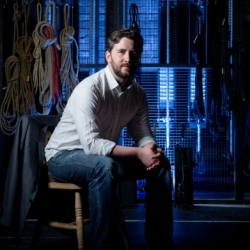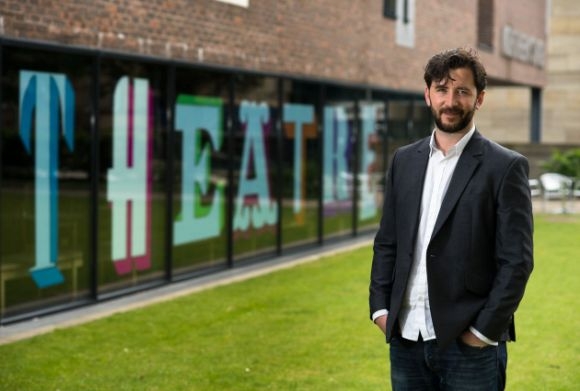Changing of the Guard: Lorne Campbell at Northern Stage
In the next in our series of interviews with new artistic directors, we speak to Lorne Campbell about taking the reins from Erica Whyman at Northern Stage

© Topher McGrillis
How did you start out as a director?
I trained at university as an actor and, when I left, a friend and I went to Edinburgh and started a small theatre company producing our own work. Through doing that, I started doing more directing than acting. I did enough directing to realise I had absolutely no idea what I was doing, so I went and did an MA in directing at the Royal Scottish Academy. And then when I left that, I was lucky enough to get placed on the Channel 4 Theatre Directors Scheme, which took me as an assistant director to the Traverse.
How has your experience prepared you for the job of artistic director at Northern Stage?
At the Traverse I was working in new writing, very much within that Traverse, Royal Court, Stafford-Clark model of new writing development. It was an incredibly lucky journey for a young director; I got to direct a lot of shows, work with great actors, work with great writers. And then when it came time to leave the Traverse, I set up Greyscale with Selma [Dimitrijevic]. We were looking at collaborative models of working with writers, outside of a traditional British new writing model.
For me, to have been within an institution like the Traverse in an early part of my career and understand institutional operations for a big part of my career, and then to have been completely outside of institutions – or interacting with institutions from the position of a very radical, small, evolutionary company – is a really useful place to come from. We've got to interrogate all those models now of how the building operates in almost every sphere of its activity.
What has Northern Stage meant to you throughout your career?
When I was doing my Masters, I came to Northern Stage on a placement and assisted Alan Lyddiard on a season of Pinter, Beckett and Mamet plays that they produced. That was one of my first proper engagements with professional theatre; I was still studying and it was a really revelatory experience for me. And then just after I finished my Masters I managed to scrape together a little bit of money to tour a production of Death and the Maiden, which Alan was kind enough to programme in the Gulbenkian Studio.
And then with Greyscale we came and spoke to Erica [Whyman] and she was really generous and gave us loads of support, even though she didn’t know us from Adam. From there, Northern Stage supported pretty much everything Greyscale ever did. My career has been substantially changed by the generosity of Northern Stage, so it’s now lovely to be in a position to be able to pay that forward to the next generation.
What challenges currently face Northern Stage?
For the big regional companies, we’re at a transition point at the moment. The models that have worked over the last 15 years are, to a large extent, no longer viable. That’s from how we’re being asked to think differently about our relationship to public funding, to the incredible attack that’s been made on local government funding, to how we engage with our audiences, to how we engage with national infrastructure – it’s all up in the air.
Do these challenges also present an opportunity?
There’s always opportunity and you can’t focus on the negative, you have to focus on the positive. Theatres, I think more than any other type of institution, must be terrified of stagnation. As soon as a theatre building isn’t responding directly to need, as soon as a theatre building isn’t in pursuit of a mission, it stagnates, and when it stagnates it quickly becomes culturally and artistically redundant.
What do you make of Erica Whyman‘s tenure as artistic director?
Erica has done the most amazing job here. She took over a building which had a declining audience, had major structural problems and was about to close for a major refurbishment. She then took the building through what was a huge refurbishment, completely changed the model by which the theatre produced work, and then over the time of her tenure has gradually, carefully, skilfully built an audience, but also built a reputation for the building and a model of functioning which is at its very core collaborative. The model that Erica built understands fundamentally that a theatre building is responsible for the people who use it, not for the people who run it.
The gift and the challenge to me taking on from that is all about evolution not revolution. Taking a Darwinian view of things, during times of ecological change it’s those organisms who can adapt fastest to new circumstances who thrive. So we’ve got to take all of that ethos and all of that skill that’s been built within the organisation, then we’ve just got to take a step back and look at our resources and how we can now use those resources as effectively as possible to serve the greatest needs for the greatest numbers of people. Then we have to try and pull everything into a really clean strategic line – through our three spaces, through all of our activities – to set a new mission for the building.

© Topher McGrillis
How are you developing that new mission at the moment?
A lot of what I’m doing at the moment is having conversations about partnerships locally, regionally, nationally and internationally, to try and line us up with people who share ethos, objectives, practice. I see as one of the profound obligations of the building to not only protect but to continue to stretch, to demand excellence from and to provide the necessary conditions for excellence for artists who are based in the North East.
There are all of these circles of community, so it’s about very local, very fledgling artists, some very established artists from the city and from the region, and some national partners like Third Angel or Slung Low or China Plate or Fuel. It’s also about working with truly inspiring international artists, like Rachel Chavkin – who’s coming to direct Catch 22 for us in the spring – who bring in a whole new idea of what practice is and what kind of work we might make.
So it’s a really complicated matrix and at the moment we’re trying to express all of those complimentary and conflicting demands to ourselves internally, so we can be very clear what the mission is. Fundamentally, to me, it is about utility. This building has to be useful; it has to be useful in a social sense, it has to be useful in a political sense, it has to be useful in an ethical sense – again, on that local, regional and national scale.
What are you hoping to do with each of Northern Stage’s three spaces?
Stage One is a big, muscular, beautiful, European style stage, and our obligation for that stage is for us to produce more of our own work and for that work to be of international class and ambition and rigour, and of profound local relevance. I’m a great believer in the Joan Littlewood view that if you make your work powerfully local enough, it immediately becomes universal. And at the same time, we try and programme work from visiting artists that is inspirational, work which has meaningful contact to our audience and brings them the very best of contemporary British, European and world theatre. And trying to build an audience; simply economically, the more we can build an audience for Stage One, the more economically viable we are.
I’m looking at the moment at the way we programme Stage Two and looking at ways that we can make that space more useful to the artists we programme and more connected to the audiences that we wish to see in that space. I’m not convinced that all the work that tours into that space really makes a meaningful contact with local audiences. We’re looking at models where we work with companies over longer periods of time, have more participation and artist development work delivered by visiting companies, but we’re still very much in the process of developing that model.
And then in Stage Three, we’re looking at developing municipal space, which is really about a space of maximum utility for a diverse range of communities in Newcastle. So from mothers and toddlers groups, to adult education, to working with charities concerned with social inclusion, to fringe theatre, to folk music sessions, to swing dance classes. A place where culture in the broadest sense is a thing that you do rather than a thing that you go and pay money to have done at you.
Over time, and as we advance our models, I hope those three spaces nourish and feed each other. We’re trying to find a way that the building has a clear pathway that runs through it which is about the beauty and the possibility of creativity and imagination, in all its manifestations.
What did you learn from Northern Stage at St Stephen’s this year?
We had a really good year in Edinburgh; the venue did really well, we grew our audience, we grew our box office, the shows did very well. Watching the community of practice, the community of knowledge, the community of enthusiasm and politics around that building is truly inspiring.
So it’s about how we now take that and how we grow it, how we make it larger, stronger, more dangerous, less controlled, and at the same time continue to offer opportunities to all of these different brackets of artists. The way that works is by listening to the artists, following their impulse, following their appetite, and then trying to be as reactive and as flexible as possible to help them realise those impulses in bigger, harder, faster, brighter colours, stronger flavours than they had thought was possible.
What is your key ambition for Northern Stage?
I want this building to create truly radical and remarkable work made by artists who live here, who are from here, who are profoundly and utterly connected to the specific audience and culture of this region. And I want that work to be world class and I want it to travel the world. Everything else we do is in service of that aim.
For more information about Northern Stage and to see what's on, visit www.northernstage.co.uk












